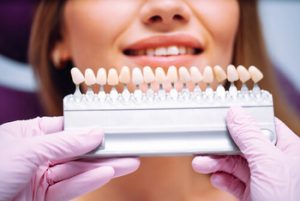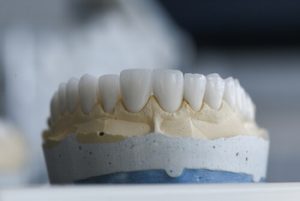In recent years, ‘veneers in Turkey’ has become a frequently searched phrase among those wishing to achieve a Hollywood smile. The concept of dental tourism, specifically venturing to Turkey for cosmetic dental treatments, has witnessed a substantial rise.
While the allure of combining a Mediterranean vacation with affordable veneers is hard to resist, it’s vital to weigh the pros and cons, especially when comparing the quality and advantages of opting for cosmetic dental treatment in Australia.
Unravelling the Mystique of Dental Veneers: Their Role and Significance
In the realm of cosmetic dentistry, dental veneers, colloquially known simply as veneers, stand out as a pinnacle of innovation. These incredibly slender shells, meticulously sculpted to align with individual teeth, have transformed how we perceive dental enhancements.
They amplify the aesthetic appeal of one’s teeth and fortify the protective layer. But what intricacies lie beneath these cosmetic wonders, and how do they metamorphose one’s smile from ordinary to extraordinary? Let’s explore this dental treatment in more detail.
Material Essence and Artistry
 Dental veneers are birthed from a symphony of art and science. The primary materials in their composition are tooth-hued substances – mainly porcelain and composite resin. Porcelain, revered for its translucence, mirrors the luminous quality of natural teeth. This translucency and its texture impart depth and realism to veneers, ensuring they don’t appear flat or artificial.
Dental veneers are birthed from a symphony of art and science. The primary materials in their composition are tooth-hued substances – mainly porcelain and composite resin. Porcelain, revered for its translucence, mirrors the luminous quality of natural teeth. This translucency and its texture impart depth and realism to veneers, ensuring they don’t appear flat or artificial.
Composite resin veneers, while less luminescent than their porcelain counterparts, offer different advantages. Their application is less invasive, often retaining more of the tooth’s original structure, making them an ideal choice for those wary of extensive enamel removal.
Dual-Purpose Craftsmanship
Beyond their aesthetic prowess, dental veneers are champions of dental protection. They are more than just cosmetic facades; they act as shields, defending the underlying tooth structure from wear, tear, and potential external damage. This dual functionality ensures that a foundation is strengthened against potential dental adversities beneath that radiant smile.
Rectifying Dental Blemishes
The transformative power of veneers is vast. They serve as solutions to a myriad of dental concerns:
- Tarnished Teeth: For teeth that have resisted the effects of whitening treatments, veneers offer a cloak of brightness, masking deep-set stains.
- Damaged Dental Structures: For teeth that have endured chips, cracks, or breaks, veneers serve as restorative canvases, recreating the illusion of untouched perfection.
- Imperfect Alignments: Not all misalignments warrant the intensive process of braces or aligners. Veneers can recalibrate the appearance for minor infractions in alignment or shape, projecting a picture of perfect alignment.
- Gaps and Spaces: Braces aren’t the sole solution for dental gaps. Veneers provide a rapid transformation for those looking for an alternative, eliminating noticeable gaps and spaces.
Precision-Driven Customisation
Every smile is unique, and dental veneers respect that individuality. Crafted with precision in state-of-the-art dental labs, each veneer is a bespoke piece of art. Attention to detail ensures that the size, contour, and shade perfectly marry with the patient’s original teeth, rendering the veneers virtually indistinguishable from the real thing.
A Testament to Resilience
Dental veneers, despite their seeming fragility, are bastions of durability. Meticulous care and maintenance can see them lasting a decade or more. Their impervious nature, resistant to common staining agents like coffee, wine, or tobacco, ensures that the brilliance of the smile they bestow remains untarnished over time.
The Dental Veneers Procedure: A Comprehensive Overview
Embracing the allure of dental enhancements, particularly veneers, requires a comprehensive understanding of the procedural intricacies involved. Dental veneers might seem like a simple cosmetic fix, but they are a sophisticated combination of science, art, and technology.
This detailed procedure aims for impeccable aesthetic refinement and emphasises patient comfort and long-lasting results. Let’s delve deeper into the multifaceted journey of acquiring dental veneers:
Consultation and Treatment Planning
Initiating the veneer journey starts with a comprehensive consultation with a cosmetic dentist. This phase encompasses:
- Open Dialogue: You’ll discuss your vision of the perfect smile, articulating any concerns or desires.
- Dental Assessment: Using modern diagnostic tools, the dentist will meticulously assess the health, structure, and aesthetics of your teeth to determine if veneers are the right fit.
- Imaging and Impressions: Advanced dental X-rays and impressions might be taken to understand your oral landscape better, facilitating precise treatment planning.
Tooth Preparation
Having determined that veneers are the appropriate solution, preparation of the destined teeth commences.
- Enamel Reshaping: Approximately 0.5 millimetres of tooth enamel is gently removed, equivalent to the forthcoming veneer’s thickness.
- Anaesthetic Considerations: A local anaesthetic might be administered to ensure a comfortable experience. This decision is jointly made, considering patient comfort and dentist recommendations.
- Impression Crafting: An impression of the reshaped tooth is created, serving as a template for the dental lab experts who will craft the veneer.
Veneer Creation
This is where the magic happens. Dental labs, equipped with state-of-the-art technology, transform the impressions of your teeth into tangible veneers. Whether porcelain or composite resin, the choice of material is worked upon with great attention to detail, ensuring it matches the desired colour, shape, and size.
Veneer Fitting and Bonding
With the arrival of the custom-made veneer, the transformation phase kicks into high gear.
- Trial and Refinement: The veneer’s initial placement is crucial. Your dentist will temporarily position it, fine-tuning and making minute adjustments to achieve that impeccable fit.
- Tooth Conditioning: Before bonding, your tooth surface undergoes cleaning, polishing, and etching, optimising it for robust adhesion.
- Cementing and Curing: Special adhesive cement is applied to the veneer. Once optimally positioned, a unique light beam activates the cement’s curing agents, solidifying it within moments.
- Finishing Touches: The dentist undertakes a meticulous post-application review, removing any extraneous cement and refining the veneer’s position to ensure a harmonious bite.
Follow-Up Visit
Post-procedure aftercare is paramount. A scheduled visit following the application serves multiple purposes:
- Gum Health Assessment: It’s crucial to ensure that the gums react favourably to the new addition.
- Veneer Inspection: A check is done to ensure the veneer remains optimally positioned and is functioning as intended.
A Word of Advice: Veneer procedures might slightly deviate based on the patient’s unique dental profile and the dentist’s methodology. Keeping an open channel of communication with your dental professional is pivotal. It ensures a tailored experience aligning with personal comfort and aspirations.
Understanding the Cost Dynamics of Dental Veneers
 As you ponder the transformative potential of dental veneers, it’s only natural to consider the financial implications. The cost of dental veneers can be diverse and influenced by various factors. While it might be tempting to chase the least expensive option, especially when confronted with international alternatives, understanding what goes into the pricing can provide a clearer perspective. Let’s break down the intricacies that shape the cost of this coveted cosmetic dental procedure.
As you ponder the transformative potential of dental veneers, it’s only natural to consider the financial implications. The cost of dental veneers can be diverse and influenced by various factors. While it might be tempting to chase the least expensive option, especially when confronted with international alternatives, understanding what goes into the pricing can provide a clearer perspective. Let’s break down the intricacies that shape the cost of this coveted cosmetic dental procedure.
Material of Choice
Porcelain vs. Composite Resin: The choice of material predominantly steers the cost. Porcelain veneers, celebrated for their natural appearance and durability, generally come with a higher price tag than their composite counterparts. While composite veneers might be more budget-friendly initially, they may not offer the same longevity or stain resistance as porcelain.
Expertise of the Dental Professional
Skill and Reputation: The adage “you get what you pay for” resonates deeply in cosmetic dentistry. Highly skilled and reputed dentists, backed by years of experience and success stories, may charge more. However, the assurance of impeccable results, fewer complications, and long-lasting veneers often justify the premium.
Geographical Location
Urban vs. Regional: Clinics located in metropolitan areas or cosmopolitan cities might have higher operational costs, reflected in the price of their dental services. In contrast, a more regional or suburban clinic might offer somewhat reduced rates. However, this doesn’t necessarily indicate a compromise in quality; it merely reflects the varying costs of living and business operations.
The Complexity of the Individual Case
Customised Care: Not all mouths are the same. Some individuals might require extensive preparatory work, including gum reshaping, bone grafting, or addressing other dental issues before veneers can be placed. The more complex the preparatory procedures, the higher the overall cost.
Number of Veneers Required
Scaling Costs: It’s straightforward – the more teeth you wish to enhance with veneers, the higher the cumulative cost. However, some clinics might offer a discounted rate per veneer if a patient is getting multiple veneers simultaneously.
Dental Laboratory & Technology Involved
Precision and Perfection: The dental laboratory crafting the veneers and the technology they use can influence the price. Labs that employ state-of-the-art technology and artisan dental ceramists ensuring veneers that are virtually indistinguishable from natural teeth might charge more for their unmatched precision and aesthetics.
Preparatory and Ancillary Procedures
Building the Foundation: Before veneers are placed, some patients might need procedures like teeth cleaning, decay removal, or root canal treatments. These ancillary services, essential to ensure the longevity and success of the veneers, add to the overall cost.
Aftercare and Warranty
Securing the Investment: Post-treatment care, including checkups, bite assessments, and potential adjustments, might influence the overall pricing structure. Additionally, clinics that offer warranties or guarantees on their veneers may have slightly higher prices, providing patients with peace of mind regarding their investment.
Dental Insurance and Coverage
Navigating Policies: While not a direct influencer of the veneer’s cost, the nuances of dental insurance can impact the out-of-pocket expenses. Some insurance plans might cover some of the costs if veneers are deemed necessary for structural or restorative reasons rather than purely cosmetic ones.
The Allure of Getting Veneers in Turkey
Competitive Prices:
Affordability: Turkey veneers pricing offers significant savings, making it attractive to many international patients. The lower costs in Turkey stem from a combination of favourable exchange rates, lower operational costs, and government incentives aimed at boosting medical tourism. But getting dental implants or veneers in Turkey may be most costly in the long run due to differences in quality, checkup costs and more.
Rapid Treatment Process:
Efficiency is Key: Turkish clinics have optimised their processes because many patients are on a tight schedule. This ensures that patients can complete their treatment relatively quickly, often within a week.
Why Australian Dental Care Still Holds the Upper Hand
Quality and Standards:
Uncompromised Excellence: Australia’s reputation in dental care is globally recognised. The rigorous training Australian dentists undergo, and the strict regulatory framework ensures that patients consistently receive world-class treatment.
Consistency Across the Board: While Turkey boasts many top-tier clinics, the quality might vary across the board. In Australia, the consistently high standard is a reassuring factor for patients.
Follow-up Care:
Continuity of Care: Procedures like veneers often require subsequent adjustments or checkups. Being near your dentist in Australia provides peace of mind and ease of access for such follow-ups.
Addressing Complications: While complications are rare, should they arise, managing them is undoubtedly easier when your dentist is locally available rather than overseas.
Dental Insurance Policies:
Coverage Considerations: One crucial financial aspect to consider is insurance. Many Australian dental insurance plans may not recognise or cover treatments conducted overseas. In contrast, domestic treatments may offer benefits or partial coverage, possibly making them more economical in the long run.
Comprehensive Treatment Planning:
Personalised Care: Australian dental clinics take a holistic approach. Beyond the cosmetic enhancement, they delve deep into the patient’s oral health, ensuring that treatment aligns well with their long-term dental well-being.
Attention to Detail: The meticulousness in ensuring the veneers look natural and offer longevity is something Australian dentists pride themselves on.
Communication:
Clear Dialogue: Seamless communication is pivotal for a successful cosmetic procedure. While many Turkish dental professionals are proficient in English, nuances and subtleties can sometimes be lost, potentially affecting the desired outcome. In Australia, direct and clear communication ensures the patient’s exact needs are met.
In-depth Considerations Before Opting for Dental Veneers Treatment
Undergoing dental veneer treatment is more than just achieving a Hollywood smile—it involves making informed decisions that have long-term implications on oral health, aesthetics, and overall well-being. Therefore, a holistic understanding of the key factors surrounding this treatment is crucial.
- Purpose of the Treatment: Before even selecting the type of veneer or the clinic, you must introspect on your core motivations. Are you seeking veneers purely for aesthetic reasons—to rectify chipped teeth or stains? Or do you have functional concerns, such as improving bite issues? The purpose directs not only the type of veneer you might choose but also the pre and post-procedural care and associated treatments you might need.
- Treatment Longevity: Veneers aren’t a one-time procedure but a long-term commitment. Depending on the material, veneers can last anywhere from 7 to 20 years. Understand that even the best veneers may require replacement or repair over time. Knowing this before time can help you prepare mentally and financially for the journey ahead.
- Oral Health Status: A foundational aspect often overlooked is the current state of one’s oral health. Dental professionals will not overlay veneers on teeth that show signs of decay, active gum disease, or severe misalignment. Addressing these underlying concerns first is paramount. Sometimes, dental treatments, like root canal treatments or crowns, may be required before considering veneers.
- Material Selection: The choice between porcelain and composite resin veneers is pivotal. Porcelain veneers are heralded for their durability and natural appearance. Their stain-resistant nature is beneficial for those fond of beverages like coffee or red wine. On the other hand, composite resin veneers, while potentially being less expensive initially, might need more frequent touch-ups. The decision here should be a blend of your aesthetic preference, lifestyle, and budget.
- Financial Implications: Beyond just the upfront costs, future expenses can include maintenance, possible replacements, and other supplementary dental procedures. While places like Turkey might offer competitive prices for veneers, it’s essential to factor in the total costs— including potential trips for follow-ups, stays, and other unforeseen expenses.
- Pre-treatment Preparations: The preparatory phase often involves the tooth enamel removal to accommodate the veneer. This procedure is permanent. It’s essential to understand that once you commit to veneers, there’s no reverting to the original condition of your teeth.
- Post-treatment Care: While veneers are resilient, they aren’t invincible. Regular dental hygiene practices are paramount. Habits such as biting nails, opening packages with teeth, or consuming extremely hard foods can jeopardise the veneers. Moreover, veneers, especially composite, can be susceptible to staining over time, making consuming certain foods and beverages a potential concern.
- Communication with the Dentist: Clear, open dialogue with your cosmetic dentist can’t be stressed enough. This involves discussing your expectations and understanding the procedure intricacies, recovery times, potential complications, and aftercare. The more informed you are, the more confident and satisfied you’ll be with the entire process.
- Location and Follow-up: Consider the logistical aspects. How feasible are follow-up visits if you opt for veneers in a foreign country? Will language barriers impact your treatment quality? Being close to your dental clinic can be a boon for routine checks and any required immediate interventions.
- Potential Risks and Side Effects: Every medical procedure comes with its set of risks. While veneers are safe, potential side effects like sensitivity, discomfort, or minor gum irritation can occur. In rare cases, veneers might not adhere correctly or might break. Awareness of these possibilities ensures you’re better prepared to address them if they arise.
- Temporal Considerations: The period between preparing the teeth and the final placement of permanent veneers is crucial. During this phase, you’ll wear temporary veneers. Understanding their fragility and the care they need can prevent potential mishaps, ensuring a smoother transition to your permanent set.
The Final Verdict
 While veneers in Turkey offer an attractive combination of vacation and cosmetic transformation at competitive prices, the decision shouldn’t be made lightly. Dental veneers are a considerable investment in your appearance and oral health. Opting for veneers, be it porcelain veneers or composite veneers, without considering the broader implications, can lead to unforeseen complications and costs in the future.
While veneers in Turkey offer an attractive combination of vacation and cosmetic transformation at competitive prices, the decision shouldn’t be made lightly. Dental veneers are a considerable investment in your appearance and oral health. Opting for veneers, be it porcelain veneers or composite veneers, without considering the broader implications, can lead to unforeseen complications and costs in the future.
Australia’s reputation in dental care, the convenience of local follow-ups, the possibility of insurance coverage, and the assurance of top-notch quality make a compelling case for choosing an Australian dental clinic over venturing abroad.
However, if the allure of Turkey is hard to resist, ensure you’ve done your homework, set realistic expectations, and are prepared for the entire dental journey.
No matter where you decide to get your veneers, remember that beyond achieving the perfect smile, your teeth’ health and functionality matter most. Always prioritise clinics and dentists that take a holistic approach, focusing on both aesthetic and dental health.
Contact Beyond Infinity Dental for a consultation. Our team will help you choose the best options for your smile makeover, ensuring you receive unparalleled expert care and results that shine. Call us today at (02) 8806 3799!
References:
https://pmcaonline.org/dental-veneers-cost-in-turkey/
https://bda.org/news-centre/latest-news-articles/Pages/Wales-the-risks-of-dental-tourism.aspx
https://www.techpreview.org/advantages-and-disadvantages-of-dental-tourism-in-eastern-europe/
https://www.dentalhealth.org/the-downsides-of-dental-tourism









